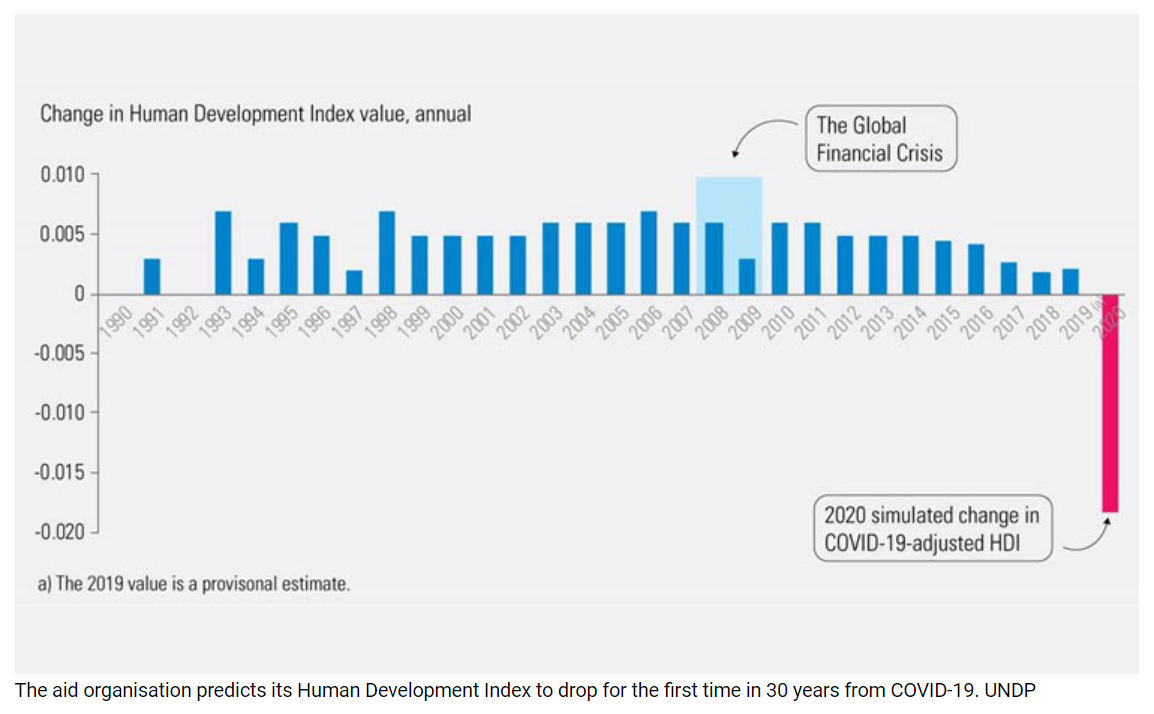Cambodia: Human development to decline for the first time since 1990
Local policymakers need to ensure Cambodia’s COVID-19 economic response continues to shield the nations most affected, because global human development is expected to decline this year for the first time since 1990, according to the United Nations Development Programme (UNDP).
The UNDP’s Human Development Index (HDI) is a summary measure for assessing long-term progress in three basic dimensions of human development: a long and healthy life, access to knowledge and a decent standard of living.
The report released yesterday, states that while the world has seen many crises over the past 30 years, including the global financial crisis of 2007-09. Each has hit human development hard but, overall, development gains have accrued globally year-on-year. However, COVID-19 – with its triple hit to health, education and income – may change this trend.
It also stated that declines in fundamental areas of human development are being felt across both rich and poor countries in every region. However, the drop in human development is expected to be much higher in developing countries [such as Cambodia] that are less able to cope with the pandemic’s social and economic fallout than richer nations.
Cambodia’s UNDP Resident Representative, Nick Beresford, told Khmer Times that while the COVID-19 crisis originally focused on health effects, the extreme social-distance response has greatly affected other domains of wellbeing. With the area’s most notably hit being educational attainment and the incomes of households and individuals – key factors that contribute to the human development index designed by the aid organisation.
“The Royal Government of Cambodia, supported by the UN agencies and other development partners, has mounted a major response to the crisis in both the health and socioeconomic spheres – aimed at protecting human development. While Cambodia remains at the early stage of the pandemic, measures adopted by the Ministry of Health have been effective at controlling the disease,” Beresford said.
“Additionally, the Ministry of Economy and Finance has planned a package of programmes to support the livelihoods of the poor and vulnerable. These measures have the potential to shield the most affected groups, but the position remains challenging and further efforts may be required to support a sustained and lasting recovery,” Beresford added.
According to the United Nations’ framework for the immediate socio-economic response to the COVID-19 crisis, the pandemic has emphasised the importance of equity, in turn, leading the framework to set out a green, gender-equal, good governance baseline from which to build a “new normal”.
The organisation recommends five priority steps to tackle the complexity of this crisis: protecting health systems and services; ramping up social protection; protecting jobs, small- and medium-sized businesses and informal sector workers; making macroeconomic policies work for everyone; and promoting peace, good governance and trust to build social cohesion.
It also called on the international community to rapidly invest in the ability of developing countries to follow these steps.
Over the past few years, Cambodia’s HDI score has levelled at around 0.58, which puts the country in the medium human development category, positioning it at 146 out of 189 countries and territories. Between 1990 and 2017, Cambodia’s HDI value increased from 0.364 to 0.582, an increase of 59.9 percent.
Cambodia’s progress in each of the HDI indicators has improved most years. Between 1990 and 2017, Cambodia’s life expectancy at birth increased by 15.7 years, mean years of schooling increased by 2.1 years and expected years of schooling increased by 5.0 years. Cambodia’s Gross National Income per capita increased by about 265.8 percent between 1990 and 2017.
Source: https://www.khmertimeskh.com/50725742/human-development-to-decline-for-the-first-time-since-1990/


 Thailand
Thailand




